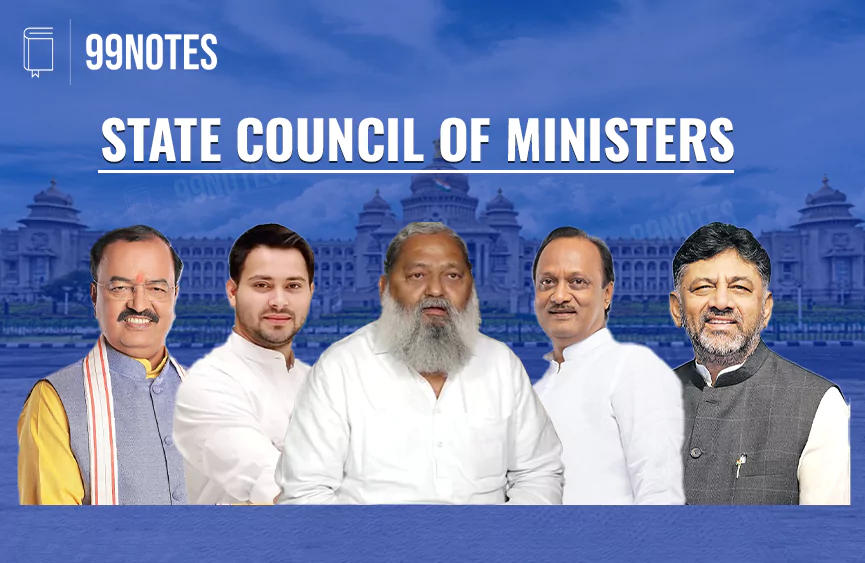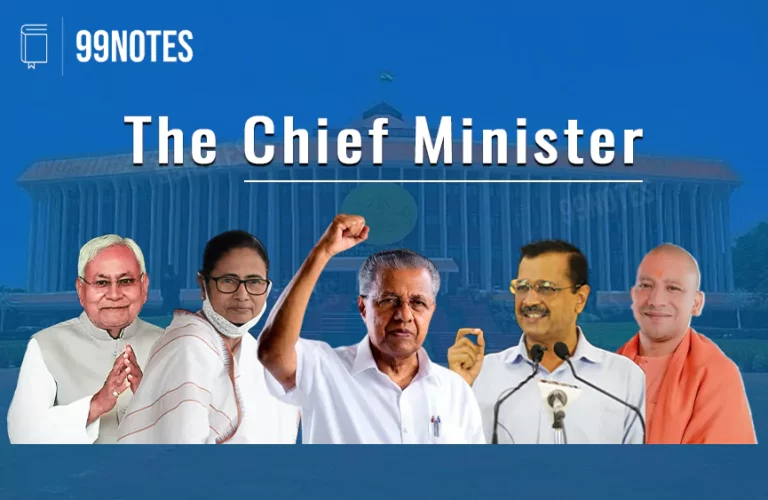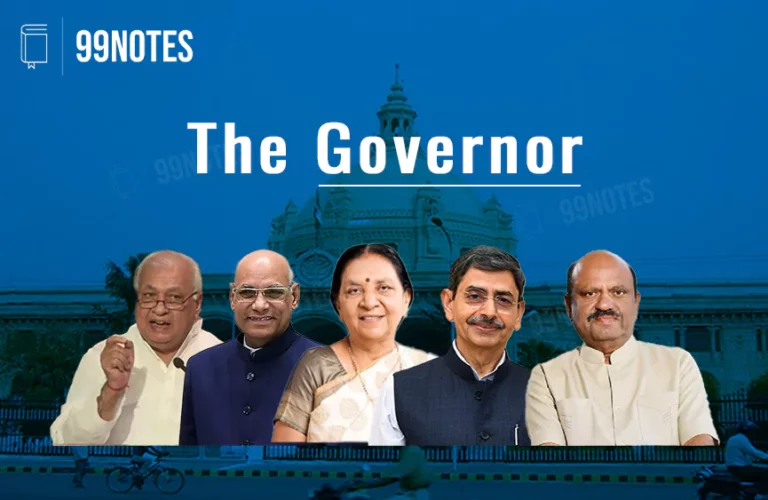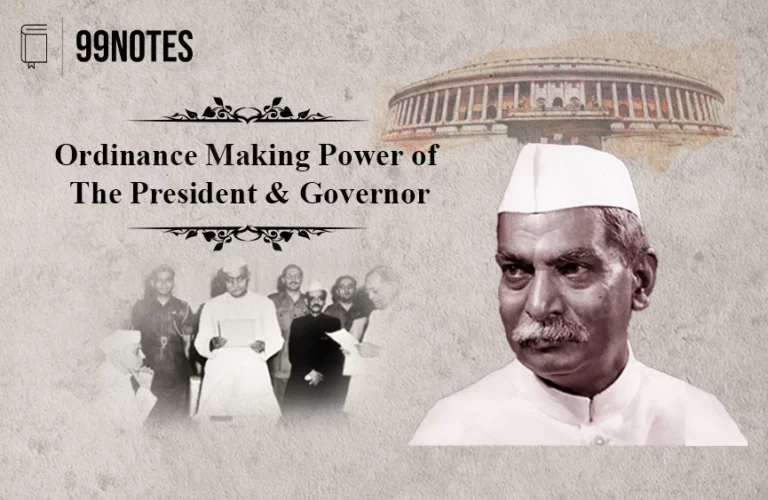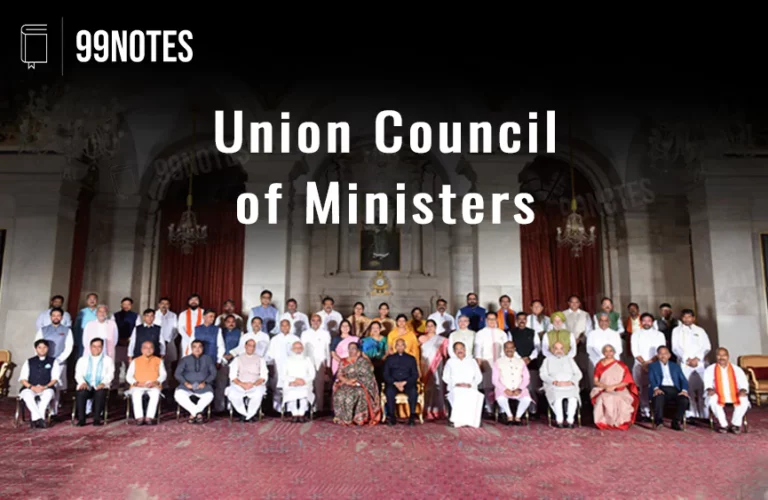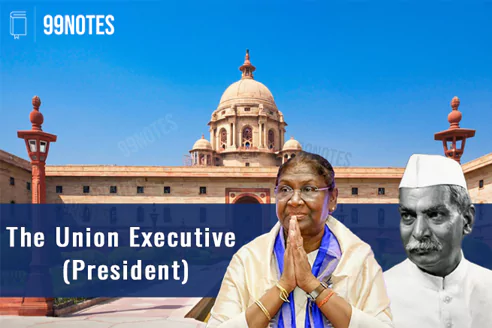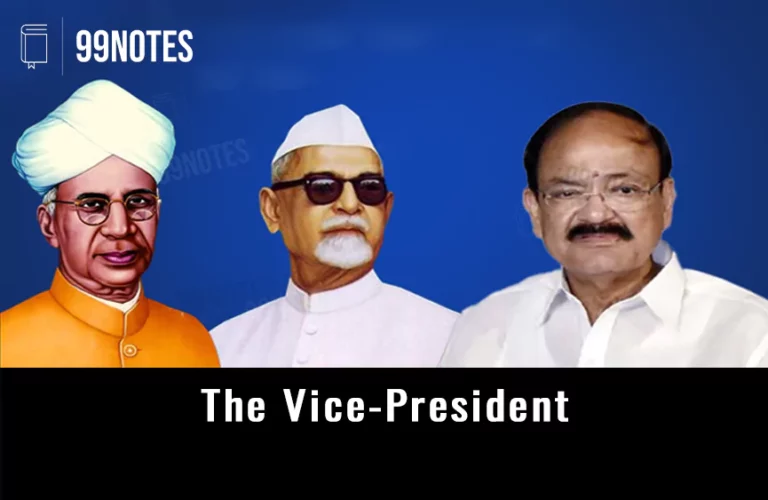State Council of Ministers- Notes for UPSC
State Council of Ministers
In a parliamentary form of government, the Council of Ministers, headed by the Chief Minister, wields the real executive power in the political and administrative system of the state (federal unit). The Council of Ministers in the states function in a similar way as at the central level.
Article 163 of the Constitution deals with the constitution of the Council of Ministers to aid and advise the Governor.
Constitutional Provisions pertaining to the Council of Ministers of State
- Article 163 (Provisions for Council of Ministers).
-
- There shall be a Council of Ministers (CoM) with the Chief Minister as its head to aid and advise the Governor except when s/he is required under the constitution to exercise his/her functions at his/her discretion.
- A minister’s advice to the Governor cannot be contested in court.
- Article 164 (Provisions related to Ministers)
-
- The Governor appoints the CM, and on his/her recommendation, the Governor appoints other ministers. The constitution also provides for a minister in charge of tribal welfare in Madhya Pradesh, Orissa, Chhattisgarh and Jharkhand.
-
- The Ministers (including the Chief Minister) hold office at the pleasure of the Governor. However, as long as the ministry enjoys a majority, the Governor cannot dismiss it.
- The state Council of Ministers is collectively responsible to the state legislative assembly.
- The Governor administers the oath of office and secrecy to the ministers.
- A minister must get elected/nominated within 6 months from his/her appointment; otherwise, s/he will cease to be a minister.
- The state legislature determines the remuneration of the ministers.
91st Constitutional Amendment Act, 2003 |
|
- Article 166 (Conduct of Business)
-
- All the executive actions by the state are carried out in the name of the Governor.
- S/he can make the rules for more convenient transactions of business of the state government and for the allocation of said business among the ministers.
- S/he can make rules spelling out the manner in which the Orders and other instruments executed in his or her name shall be validated.
- Article 167 (Duties of Chief Minister and other ministers) : The Chief Minister is the primary channel of communication between the Governor and the Council of Ministers; in this regard, the constitution entrusts the Chief Minter with the following duties:
-
- All decisions of the CoM regarding the administration of state affairs and legislative proposals shall be communicated to the Governor of the state.
- To provide any information regarding the administration of state affairs and legislative proposals that the Governor may call for.
- Any subject on which a minister has reached a decision but has not been taken into consideration by the Council of Ministers shall be submitted for the consideration of the Council of Ministers if the Governor so requires.
- Article 177 (Rights of Ministers)
-
- Every minister has the right to speak and take part in the proceedings of the legislative assembly and the legislative council (in the case of the bicameral legislature).
- S/he can also take part in any committee of which s/he is eligible for membership, but s/he is not entitled to vote.
Composition of the Council of Ministers of States
The constitution does not specify the size of the Council of Ministers (However, it puts the limit of 15% of the strength of the state legislature) or the ranking of the ministers.
The State Council of Ministers is headed by the Chief Minister and comprises ministers who are members of the Cabinet, Minister for State, Minister of State (independent charge) and Deputy Ministers.
The political position, emoluments and role in decision-making differ as per the rank of the ministers.
Cabinet Minister
- They occupy the key ministries of the Government like Home, Finance, Education, Agriculture etc.
- Being members of the Cabinet (highest decision-making body), they play an important role in the formulation of government policies.
- Thus, their roles and responsibilities go beyond their respective ministries and extend to every aspect of the state government.
Ministers of State
- They usually function under the supervision of a cabinet minister; they are allotted specific duties in a ministry headed by a cabinet minister or in charge of a particular department under that ministry.
- They can also be given a charge of independent ministry, in which they perform functions similar to a cabinet minister.
- However, they do not participate in the cabinet meetings unless specifically invited.
Deputy Ministers
- They perform under the supervision of the cabinet minister or minister of state.
- They are attached to the offices of cabinet ministers and Ministers of state and assist them.
- They are not given independent charge of any ministry and do not attend cabinet meetings.
Deputy Chief Minister |
| This post is not mentioned in the constitution, and they are appointed mostly for political purposes. They are usually a part of the Council of Ministers. |
Appointment of Ministers of States
- The Chief Minister is appointed by the Governor, and on his recommendation, the Governor appoints other ministers.
- The constitution mandates that there should be a minister in charge of tribal affairs in the states of Madhya Pradesh, Orissa, Chhattisgarh, and Jharkhand.
- Generally, elected/nominated members of the Legislative Assembly and Legislative Council (in the case of the bicameral legislature) are appointed as ministers. However, an unelected person can also be appointed as a minister, but s/he must become a member (either elected/nominated in either House) within 6 months of the appointment.
- A minister of one House can also speak and participate in the proceedings of other House too; however, s/he can only vote in the House s/he belongs to.
Oath of Ministers of States
The Governor administers oath or affirmation of office and secrecy to the ministers before they take up the office.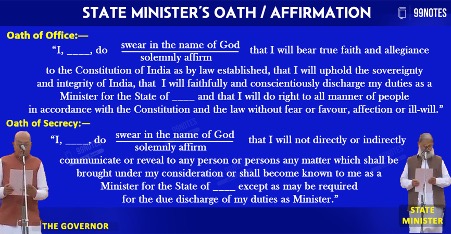
Remunerations of Ministers
- Remunerations of the ministers are determined by the state legislature from time to time.
- A minister gets a salary equivalent to a member of the state legislature. In addition, s/he is entitled to sumptuary allowances as per his/her rank, rent-free accommodation, medical facilities and travel allowances.
Relation between Council of Ministers and the Governor
Article 163 of the Constitution provides for a state Council of Ministers to aid and advise the Governor in the exercise of his/her functions except when s/he is required under the constitution to exercise his/her functions at his/her discretion.
- A minister’s advice to the Governor cannot be questioned in court. This shows the intimate relationship between the Governor and Ministers.
- However, where Governor’s discretion is required, their desision is final, and its validity cannot be questioned in any court based on whether they should have acted in their discretion.
Supreme Court Rulings on Council of Ministers:
- In Shamsher Singh & Anr vs State of Punjab (1974), the Supreme Court ruled that the Governor has to act only on the aid and the advice of the Council of Ministers except in areas where the Governor has to act in his/her discretion. The court also ruled that wherever the constitution requires the satisfaction of the Governor, it does not mean the personal satisfaction of the Governor but the satisfaction of the Council of Ministers.
- In the Nabam Rebia case (2016), the Supreme Court ruled that as per Article 174 (read with Article 163), the Governor can summon, prorogue and dissolve the state legislative only on the recommendation of the Cabinet.
Collective Responsibility of State Council of Ministers
As per Article 163 of the Constitution, the state Council of Ministers is collectively responsible to the state Legislative Assembly.
The Principle of collective responsibility refers to individual members of the government being held accountable for the actions and decisions of a government as a whole.
It is a fundamental principle in the working of a parliamentary system, under which, it is the duty of every member of the council to stand by the decisions of the Council of Ministers (Cabinet), both inside and outside of the state legislature.
How does the principle of collective responsibility manifest?
- When the Lower House passes a no-confidence motion, all members of the council are required to resign, including those who are members of the Legislative Council.
- The Chief Minister’s power to recommend the appointment of ministers as well as dismiss them is in line with the Principle of collective responsibility.
- The real test of the Principle happens when there is a coalition government where ministers belong to different political parties.
- If a minister disagrees with a cabinet decision or is not ready to defend it, then s/he must resign. There are several instances when ministers have chosen to resign in case of disagreement with the Council of Ministers (Cabinet).
- Further, the existing ministry continues till a new ministry is constituted. In 1971, the Supreme Court ruled that a Council of Ministers should always exist even when the assembly is dissolved or the ministry has resigned.
It must be noted that this Principle is based on a convention developed in the Parliamentary system of government and does not have a legal or constitutional sanction.
Individual Responsibility of a Minister of a State Goverment
- Besides collective responsibility, the constitution has provisions for individual responsibility of ministers.
- As per Article 164, the constitution provides that the ministers hold office at the pleasure of the Governor. It means the Governor can dismiss a minister anytime on the recommendation of the Chief Minister.
- These provisions ensure the Principle of collective responsibility.
Legal responsibility of a Minister
Similar to provisions at the central level, the constitution does not provide for a system of legal responsibility in the states.
In India, a minister is not required to countersign an order of the Governor for a public act. Moreover, no court can enquire into the nature of advice tendered by the minister to the Governor.
Cabinet
It is a smaller body than the Council of Ministers and consists of Cabinet Ministers. It is the real centre of power in the state. Cabinets in state governments perform the following roles:
- It is the supreme executive authority of the state government, responsible for aiding and advising the Governor;
- It is the highest decision-making body in the state government and deals with the political and administrative affairs of the state.
- It plays the most important role in the formulation of policies of the state government.
- It advises the state Governor.
- It plays an important role in the financial and legislative matters of the state government.
- It deals with situations of crisis and emergency in the state.
- It exercises control over high-level appointments, such as constitutional authorities and senior bureaucrats in the state.
Cabinet Committees
- These committees are instrumental in expediting the decision-making process in specific areas of political and economic importance.
- They usually consist of cabinet ministers.
- They are set up by the Chief Minister as per requirement; hence, their numbers, agenda and nomenclature change from time to time.
- Types:
-
- Standing: These committees are permanent in nature.
- Ad hoc: These are of a temporary nature and are constituted to deal with unique problems.
Position of State Council of Minister
- From the above description, it is evident that the state Council of Ministers wields real authority in the political set-up of the state.
- Within the Council of Ministers, it is the Cabinet that steers the ship of the state government. It supervises and controls the formulation of policies and the running of administration.
- The power and position enjoyed by the Council of Ministers (Cabinet) make it the most powerful institution in the state.
Other Related Links:
| President of India | Vice President |
| Prime Minister | Union Councils of Ministers |
| The Governor of States | Chief Minister |

